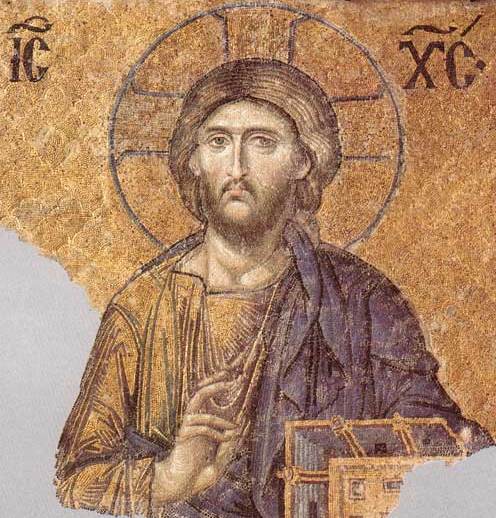|
In the patriarchal age, men prostrated themselves not only to God
but also to rulers. But during the Lord's earthly ministry, this
was not very common. Later the Byzantine emperors would demand the
full frontal face-plant from those ushered into their august
presence, but that offensive practice had not yet
started; in this period, even the Roman emperor did not expect
prostration. Nevertheless, the disciples prostrated themselves
before the Lord: "And as they went to tell his disciples, behold,
Jesus met them, saying, All hail. And they came and held him by the
feet, and worshipped him." (Matthew 28:9); "And when they saw him,
they worshipped him: but some doubted." (Matthew 28:17).
This Greek word, 'proskuneo,' did not originally mean 'bow down,'
but after it was used in the Septuagint to translate the Hebrew 'shachah,'
as it is for instance in the passage just mentioned, Genesis 18:2, it does come to have
that implication. It originally meant something like 'blowing a kiss,' a gesture of adoration
which the pagans made to their idols, so the Seventy evidently felt
it would serve for 'bow down,' a change of posture that implies
worship. Making this change of posture shows that
the petitioner is humbling himself before Almighty God.
A variety of postures and attitudes of prayer are mentioned in the
New Testament. Prostration before God may not have been all that
common, but let us concede for the sake of the argument that the
disciples were in the habit of prostrating themselves before
Almighty God. We have just seen them doing it, in Matthew 28:9 and
28:17. They'd done it before: "Then they that were in the ship came
and worshipped him, saying, Of a truth thou art the Son of God."
(Matthew 14:3). So do wise men: "And when they were come into the
house, they saw the young child with Mary his mother, and fell down,
and worshipped him: and when they had opened their treasures, they
presented unto him gifts; gold, and frankincense, and myrrh."
(Matthew 2:11). People in trouble bow down before the Lord: "And,
behold, there came a leper and worshipped him, saying, Lord, if thou
wilt, thou canst make me clean." (Matthew 8:2). "While he spake
these things unto them, behold, there came a certain ruler, and
worshipped him, saying, My daughter is even now dead: but come and
lay thy hand upon her, and she shall live." (Matthew 9:18). Like the
leper we are unclean, like the little girl we are dead in sin, so
why not prostrate ourselves before the Lord, Almighty God, and ask
Him to heal us?
Daniel 2:46, however, shows Nebuchadnezzar falling down on
his face before Daniel, a mere man: "Then King Nebuchadnezzar fell
on his face, prostrate before Daniel, and commanded that they should
present an offering and incense to him." But this practice was not acceptable to
everyone; see Acts 10:25-26: "And as Peter was coming in, Cornelius
met him, and fell down at his feet, and worshipped him. But Peter
took him up, saying, Stand up; I myself also am a man." Peter,
who had been instructed by the Lord, did not consider prostration
before a mere man acceptable practice.
The four-and-twenty elders fall down upon their faces:
"The four
and twenty elders fall down before him that sat on the throne, and
worship him that liveth for ever and ever, and cast their crowns
before the throne, saying, Thou art worthy, O Lord, to receive glory
and honour and power: for thou hast created all things, and for thy
pleasure they are and were created." (Revelation 4:10-11).
Notice before Whom they fall down, the "four and twenty elders fell
down before the Lamb" (Revelation 5:8). People can 'fall down' onto
their knees, like the old song says: 'Four-and-twenty elders on
their knees, Lord have mercy if you please.' The four-and-twenty
elders, however, do fall on their faces in worship: "And the four
and twenty elders, which sat before God on their seats, fell upon
their faces, and worshipped God. . ." (Revelation 11:16). This would
be something for Muslims to emulate!
Possibly too, like other anti-trinitarians, they think there is
something in Christ's prayer at Gethsemane, beyond His posture, that
makes for their side.

|
















